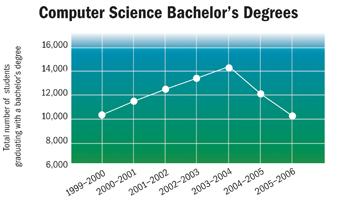The University’s Department of Computer Science faces a nationwide problem of dropping enrollment, particularly among women students.
Data collected by the Computing Research Association, a group of professional and academic computer science organizations in North America, shows the number of computer science degrees granted in the United States has drastically decreased in the past two years. This is a stark reversal from the previous trend of steady growth.
The University’s enrollment figures, while more erratic, also show a decrease. According to information from the Office of Budget and Planning, during the 2001-2002 academic year there were 63 computer science bachelor degrees granted, including 13 to women. For the 2005-2006 year there were only 47 degrees, and seven of them went to women.
Antonio Lopez, computer science professor and researcher at Xavier University in New Orleans, said part of the problem is the field’s negative public image.
“The myth that we need to bust is the perception that the males are a bunch of geeks and nerds,” he said.
This public perception may be linked to the decreasing number of women in the field. According to the National Science Foundation, an independent federal agency that funds research at colleges and universities, the percentage of female computer science graduates has been dropping, down to 25.1 percent in 2004 after peaking at 28 percent in 2000.
Lopez said part of changing the perception requires emphasizing that computer science is more than just programming. In a paper addressing this issue, he wrote the academic community needs to present computer science in “a human and social context.”
By doing this, Lopez argues the field will be made more “compelling and meaningful” to students.
Not everyone agrees the field should place more focus on the social aspects.
Stacy Warrick, computer science senior, said she thinks trendy “jargon” and “buzzwords” currently dominate the field.
“Honestly, I was hoping it would be all programming and coding,” she said. “It’s turning out to be significantly more soft skills and presentation and salesmanship than I hoped it would be.”
S. S. Iyengar, chairman of the University’s computer science department, said “hidden problems” plague the issue of declining enrollment and will be “tough” to solve. Though Iyengar said the University’s problem was not as bad as the national issue, he made it clear that the current system needs improvement, especially in post-graduate recruitment.
Iyengar said enrollment is dropping in the University’s doctoral program because private companies offer lucrative jobs to graduates with only bachelor’s degrees. These employment opportunities leave many students with little reason to invest time and money in post-graduate academic work.
“The incentive isn’t there in the industry,” Warrick said. “There’s not demand in the industry for post-graduate degrees.”
The perceived lack of demand for employees with post-graduate degrees may be related to recent changes within the relatively new field.
Lopez described a recent revolution that plays a huge role in the computer science industry. He said shifts in the economy caused by the dot-com bust and the events of September 11, 2001, led to monumental changes that continue to affect the computer science field. Recent drops in enrollment appear to be influenced by this shift.
Despite flagging enrollment in the department, Coretta Douglas, computer science instructor and undergraduate coordinator, said the trend may be merely cyclical. She also expressed confidence in the University’s ability to recruit new students into the program.
“Excellent, cream-of-the-crop students in Louisiana want to be here at LSU,” she said. “We are sitting on a gold mine.”
—–Contact Daniel McBride atdmcbride@lsureveille.com
Women enrollment falls behind
May 1, 2007




